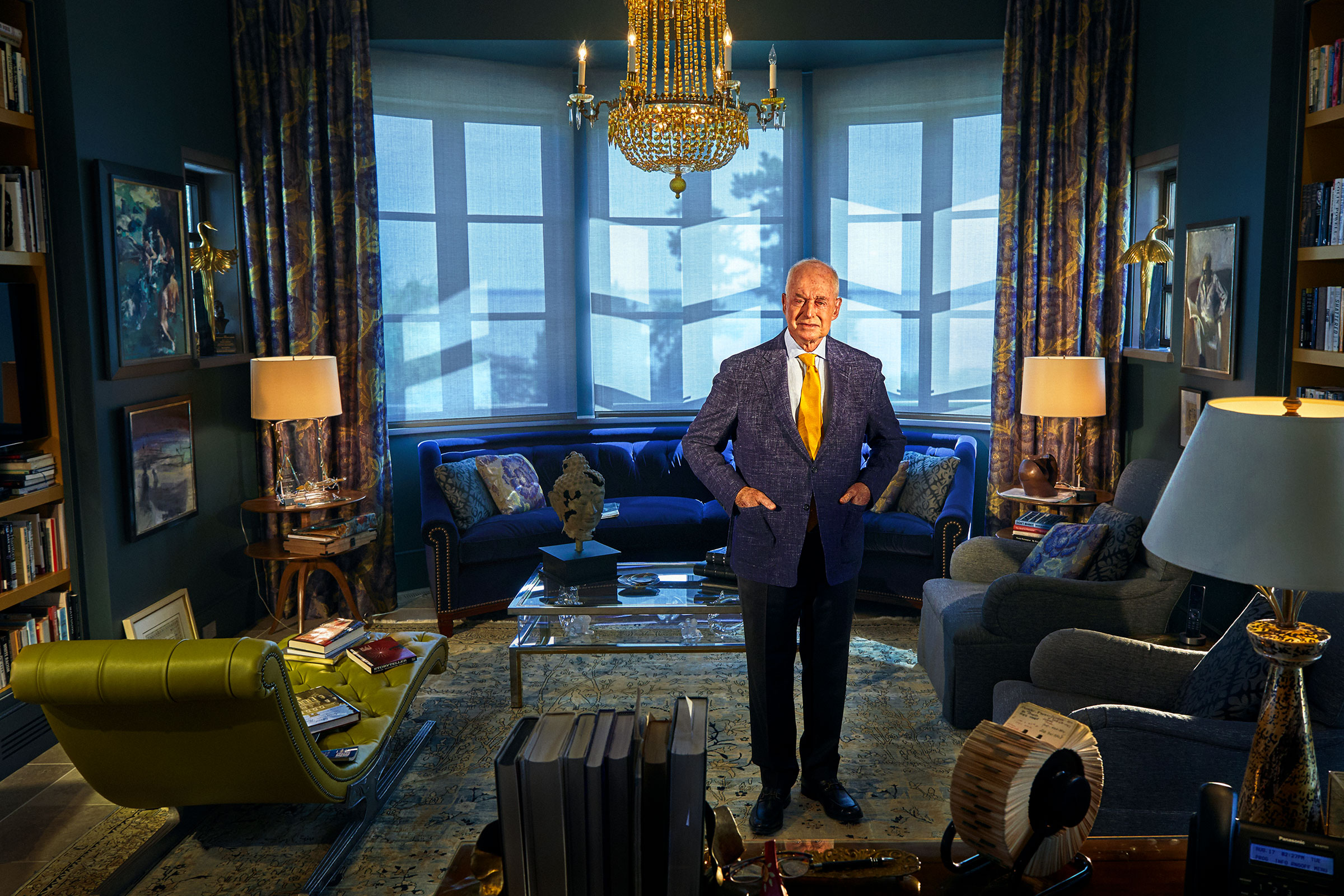
About a decade ago, when his mansion in upstate New York started feeling too cramped for all his grandkids, Jules Kroll, the world’s most famous private detective, set out to build a bigger one on a neighboring parcel of land. The owner of the plot sensed an opportunity and tried to jack up the price. So Kroll looked into the neighbor’s past, he recalls with a smile as we stood at the back of the property one morning last spring. “The guy didn’t know who he was dealing with.” In the end, Kroll got the price he wanted.
He also made a point about the industry he pioneered. An investigator’s skills, he says, “are like any other weapons.” They can be used for good, for ill or simply for profit. Since he founded his first investigative firm in 1972, Kroll’s clients have included aggrieved governments, major corporations and a Wall Street fraudster who now resides in prison. His exploits have become like folktales in the industry: the time he found the KGB’s secret bank accounts in Switzerland, or his quest to trace the offshore fortune of Saddam Hussein. His targets have included corrupt politicians, oligarchs and, on at least one occasion, a victim of sexual assault. Some of his investigations have blown up in his face. By his own account, too many.
So it surprised me to hear through a mutual friend last winter that Kroll was still alive, still at work, and eager to talk to a reporter. He has avoided interviews in recent years, partly because he is known for discretion, but also because his industry has lately been involved in more high-profile scandals than the Mafia. On behalf of one client in 2018, Kroll’s firm was caught using deception to defend the use of asbestos, a known carcinogen. The previous year, it had emerged that various private investigators, including Kroll’s firm, had worked for Harvey Weinstein, the former movie mogul who has since been convicted of rape. Through revelations like these, the industry has become known for using the modern tools of espionage—hacking, surveillance, infiltration, misdirection—in ways that confer power and impunity upon the rich.
This was one of the reasons Kroll wanted to talk. When he first reached out to me in February, he was a few months away from his 80th birthday, and he clearly had concerns about the way his work had been depicted in the press. “It may not be easy to believe these days,” he says. “But there is some good we can do in the world.”
In Kroll’s telling, the value of being a spy for hire goes beyond making money. Private investigators, Kroll argues, are adept at recovering stolen wealth and finding evidence of crimes that law enforcement has no interest in probing. Given the right incentives, they can act as the bounty hunters of the global economy, Kroll suggests, and even as agents of transparency. “We keep the fish tank clean,” he likes to say, portraying himself and his colleagues as humble snails collecting scum from the glass so that a bit more daylight might reach all the tank’s inhabitants.
The image is colorful but false. Kroll is no gastropod. By reputation, he is ruthless and relentless, an intimidating force within the industry. (Three of Kroll’s competitors declined to speak to me on the record about him.) In person, he presents himself as a gracious family man with a single-minded dedication to finding and revealing the truth. Pressed to talk about the recent scandals in his field, he sticks to a familiar line: mistakes were made, and nobody is perfect. Over the course of several interviews, it seemed clear that the investigator had come forward to burnish his reputation and promote a rosy picture of his work.
To a legion of critics, the ghoulishness of the Weinstein affair alone was reason to deny Kroll that opportunity. Yet his field is only growing, in numbers and in power. As of 2019, there were 36,200 licensed private eyes in the U.S. alone, according to the Department of Labor. So many of them have studied under Kroll that a historian once referred to him as “the Johnny Appleseed” of the private-investigations industry. “We are everywhere,” says one of his former employees and acolytes, Tyler Maroney, who now runs his own investigations firm in New York. “There are thousands of us out there who are Kroll alumni.”
Their work has never been more prominent—or controversial. The last two U.S. presidential elections have both been shaped by the kind of political dirt that private detectives excel at gathering. The 2016 race was tainted by the dossier of lurid claims against Donald Trump, assembled (for a price) by Christopher Steele, a former British spy, and shopped to reporters by a private-intelligence firm before some of its key claims and sources were discredited. In 2020, it was a trove of emails and raunchy photographs belonging to Hunter Biden, leaked to the press in the weeks before Election Day.
Kroll had nothing to do with either controversy, though he says he was approached with a request to disprove the Steele dossier’s allegations against Trump. He declined the job, he told me, because “the incentives were not there.” (His feelings toward Trump may also have had something to do with that decision; a roll of toilet paper in Kroll’s guest bathroom had the former President’s face printed on it.)
Of all the cases he has taken over the past half-century, there are plenty that Kroll regrets. But he offers no apologies on his industry’s behalf, not even for working with Weinstein. It was one bad decision, he told me, in a lifetime of clients. “Are there some sleazy private investigators? Absolutely,” he says. “Do we make mistakes? For sure. But 100,000 cases later, the percentages are pretty good.”
When Kroll came to the door for our first meeting in March, the detective looked tired, his eyes sharp but droopy like a bloodhound’s. He had returned that week from a trip to California, where his youngest son, Nick Kroll, the celebrity comedian, had just had his first child. The birth had brought Kroll’s brood of grandchildren to what he calls a baker’s dozen. A digital frame on a side table showed their pictures in a constant loop.
The family milestone might have served as an occasion to consider retirement. But that was far from Kroll’s mind. “When I look in the mirror, obviously I’m not a youthful chap anymore,” Kroll said as we sat down at the dining table where he had camped out during the COVID-19 lockdowns, digging through investigative case files. “But I don’t feel like an old man.”
For many operatives of his generation, Kroll’s name is still synonymous with the service he provides: collecting secrets for a price. Before the advent of Google, older bankers and finance types often invoked it as a verb, as in: make sure to Kroll that guy, find out everything there is to know. The right to use his name in the business of private investigations has been sold and resold. The first buyer was an insurance company, which paid a staggering $1.9 billion for control of Kroll Inc. in 2004. (Kroll walked away with $117 million.) The current owner is a risk-management firm called Duff & Phelps. It has nothing to do with Jules Kroll, but it markets its services under the Kroll name, according to its website, kroll.com. “I now compete against my own name,” the actual Kroll told me.
As we sat in his dining room, Kroll took me through some of his ongoing investigations. One involved a search for the foreign assets of members of the Venezuelan government. For several years, Kroll’s firm, known as K2 Integrity, has been collecting intelligence on regime officials who had moved vast amounts of wealth offshore. “We have actual bank accounts,” Kroll says. “Swiss banks, names of the people, the amounts, the transfers, where they came from. It’s pretty good stuff.”
The intended client for this information was meant to be the government of Juan Guaido, the opposition leader whom the U.S. recognized in 2019 as the acting President of Venezuela. But Guaido’s attempts to topple the ruling regime fizzled, leaving Kroll without a buyer for his dossier of Venezuelan secrets. “We keep waiting for somebody else to sign a contract.” Among the handful of potential clients is the U.S. government, he says.
The Venezuela investigation is the type of work Kroll is keen to highlight: cases that expose kleptocrats, fraudsters and cheats. His early career was defined by such cases, glamorous investigations that support his contention that digging dirt doesn’t always make you dirty. In a pair of assignments in the 1980s, Kroll traced the fortunes that two dictators —Ferdinand Marcos of the Philippines and Jean-Claude Duvalier of Haiti—had siphoned out of government coffers. His most famous escapade came in 1991, when the government of Kuwait hired him to track down Saddam’s wealth. Along with a team of former detectives, spies and investigative journalists, his firm managed to find more than $6 billion of the Iraqi despot’s money stashed around the world. The following year, the Russian government hired Kroll to find the KGB’s money, which had been spirited out of the country in the months before the Soviet collapse. Kroll delivered.
The news coverage of these cases, including a treatment on 60 Minutes, placed him in the canon of celebrity detectives, alongside Sherlock Holmes and Allen Pinkerton. Newsweek referred to Kroll’s firm as “thug busters.” A write-up in TIME in the spring of 1991 featured a portrait that now hangs on a wall next to Kroll’s family photos; it shows the detective in a pair of suspenders, an unlit cigar in his hand, both arms wrapped around a briefcase full of files.
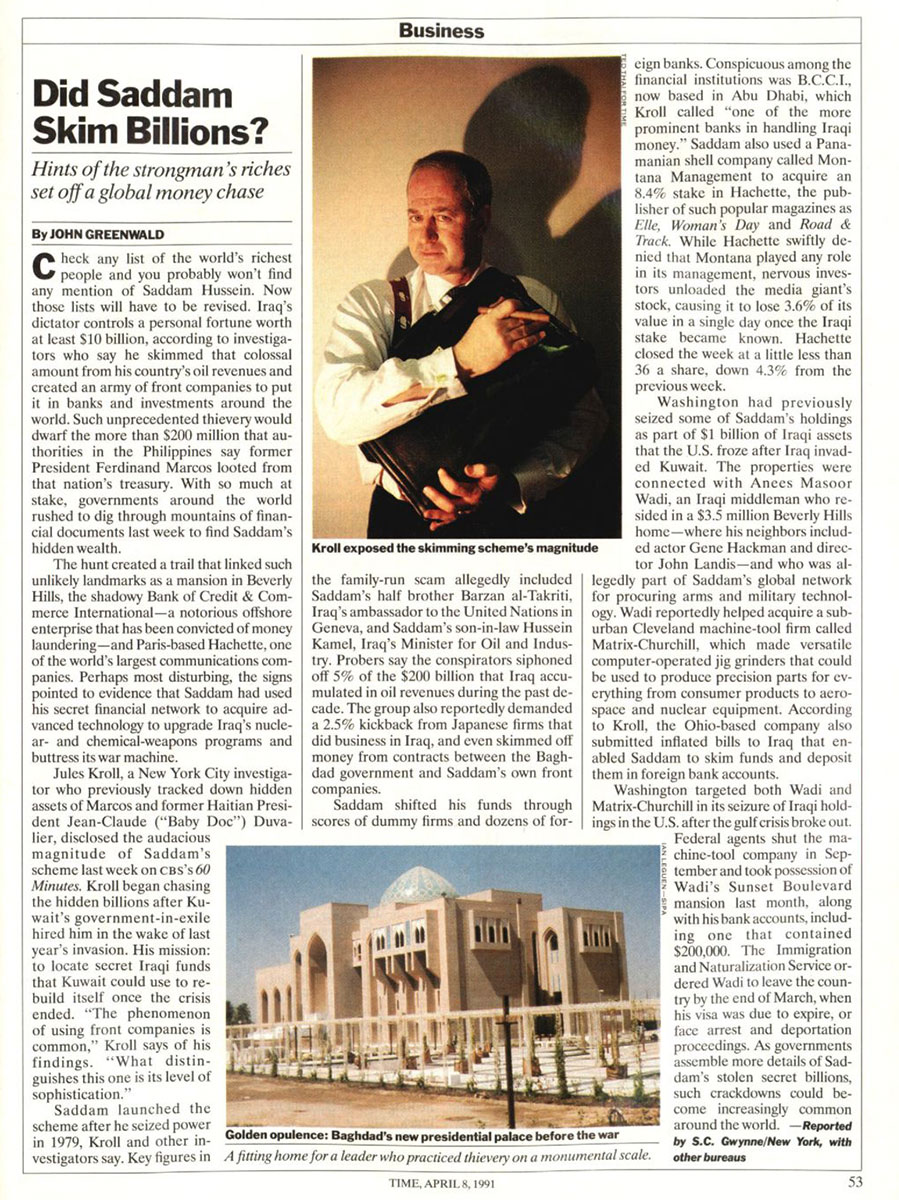
But despite the mythmaking, his more illustrious clients—the United Nations, say, or the House Foreign Affairs Committee—are the exception. The standard assignments, and the ones that truly built Kroll’s fortune, are undertaken for law firms and corporations, which regularly hire private eyes to gather evidence in legal disputes, run background checks or scope out takeover targets. In the early years, when private investigators “wore a dirty raincoat and smoked cigars and had a fedora,” he says, Kroll’s innovation was to give the business a corporate gloss, offering its services not only to jealous husbands but Fortune 500 companies.
By the 1990s, private investigators had become fixtures of Wall Street, working alongside lawyers and bankers in the board room. At its peak in 2008, Kroll’s company had more than 5,000 employees at offices around the world. When the failure of Wall Street rating agencies contributed to the global financial collapse that year, Kroll founded a rating agency of his own, promising that his powers of investigation would be able to spot the cracks in the system before it fell apart again. This new line of business—rating bonds, stocks and other financial instruments—shifted Kroll’s focus away from his original stock-in-trade just as a new breed of competitors emerged.
The most famous was Black Cube, founded in 2010 by a group of former Israeli intelligence officers. Its approach to investigations was cutthroat. Some of its operatives are known to have hacked their targets. The firm’s most infamous case involves Weinstein, whose lawyers hired Black Cube to go after the mogul’s accusers.
The same lawyers also hired Kroll’s firm, then known as K2 Intelligence, to investigate the Filipina-Italian model Ambra Battilana Gutierrez, who had accused Weinstein of groping her. Using public records and sources in Italy, K2 assembled a dossier on Gutierrez in 2015 that included details of her past relationships, along with other information that could be used to discredit her. The firm’s allies and operatives passed this information to the office of the District Attorney in Manhattan. The dirt also reached the New York tabloids, which ran embarrassing stories about Gutierrez. Prosecutors decided not to charge Weinstein that year, citing insufficient evidence.
From the start, Kroll told me, the assignment did not sit well with him. He says he had repeatedly turned down offers of work from Weinstein, whose history as a sexual predator had long been an open secret in his circle. Kroll knew about it. “I warned him,” he says. “I told him that this kind of behavior is going to destroy you.” Still, he agreed to investigate Gutierrez, he says, because it seemed like an insignificant assignment. It took about two weeks to complete, Kroll says, and K2 never worked for Weinstein again.
But the mogul had plenty of other private eyes on his payroll. Among them was a firm called Kroll Inc., which Kroll had founded and led until his departure seven years earlier. Under its new leadership, the eponymous firm picked up the case where K2 had left it. Gutierrez signed a nondisclosure agreement with Weinstein in 2015. Its terms required her to give control of her email accounts and electronic devices to Kroll Inc. According to Ronan Farrow, who first broke the story in The New Yorker, the firm’s operatives then tried to wipe the devices of any evidence against Weinstein.
Jules Kroll says he was not involved in that part of the operation, but he knows the case is a black mark on his name. “It’s an eponymous institution,” he says. “The firm and its founder get conflated.”
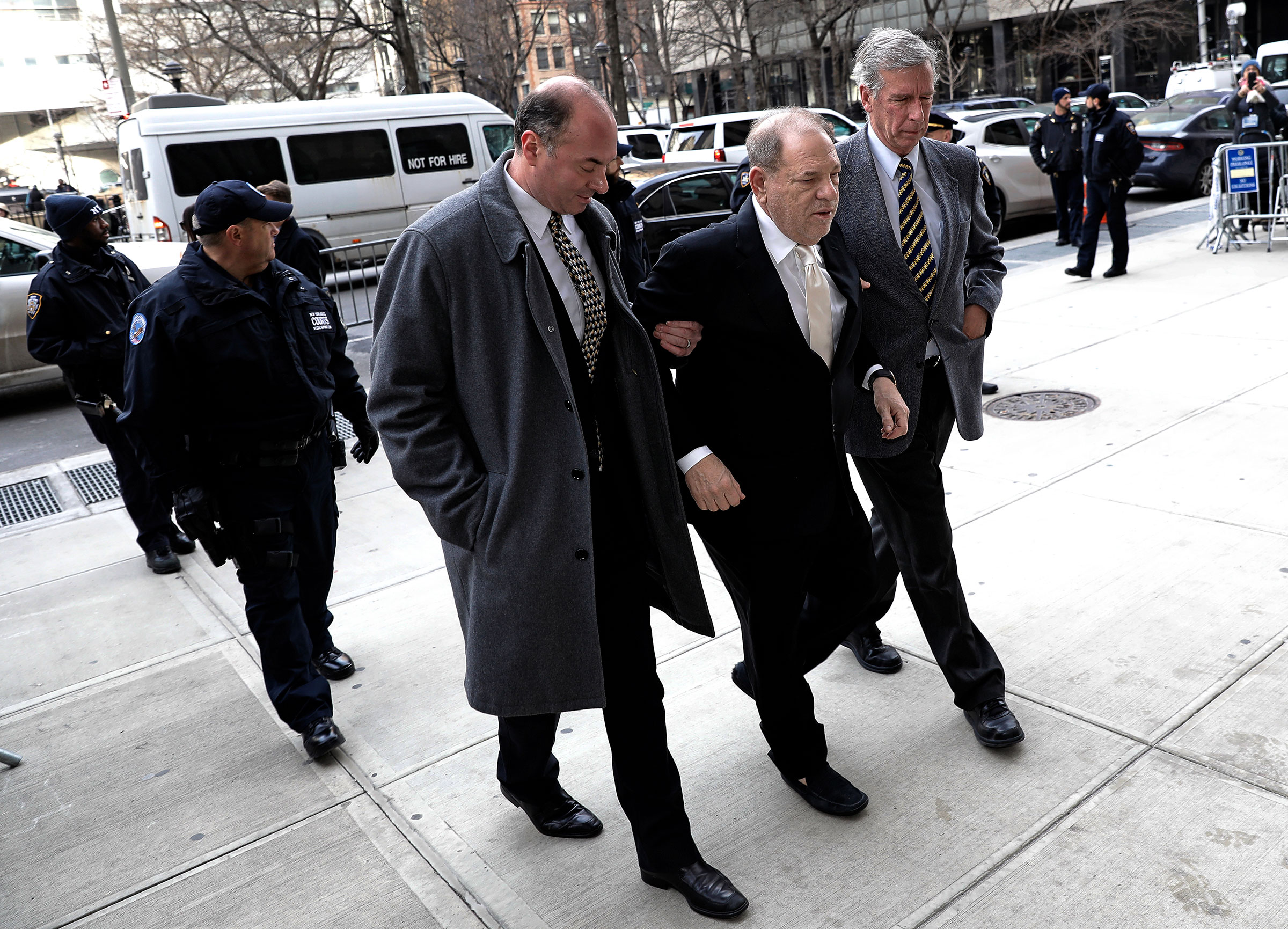
Months after Kroll says he turned his back on Weinstein, the mogul turned to Black Cube, which was already known in the industry for crossing ethical lines. (The firm declined to comment.) Apart from allegations of hacking and online harassment, Black Cube employed a practice known as “pre-texting,” in which its operatives use false identities to deceive their targets into revealing information. The firm reportedly used that tactic against one of Weinstein’s accusers, the actress Rose McGowan, and against journalists who were reporting on Weinstein’s history of sexual predation. “These people have no brakes,” Kroll says of Black Cube.
But the criticism sounds hollow. Kroll’s firm has been known to use similar methods. For its client in the asbestos industry, K2 sent an operative to infiltrate a group of anti-asbestos activists by pretending to be a documentary filmmaker. Kroll says that case was another mistake. So was his work for Allen Stanford, a Wall Street financier who was convicted in 2012 for running a massive Ponzi scheme and sentenced to more than a century in prison.
When they add up all these mistakes, Kroll’s critics see a pattern of abuse that needs to be reined in, either through government regulation or public pressure. “Few professions are more deserving of a comeuppance than the smug and morally bankrupt men and women who work as spies-for-hire,” Barry Meier, the reporter who broke the story of the asbestos case in the New York Times, writes in his recently published book, Spooked, which spends nearly 300 pages raking Kroll and his counterparts over the coals.
Kroll declined to be interviewed for that book, and he seems to have little time for Meier’s critique of moral bankruptcy. “It has nothing to do with morality,” he told me about his process for deciding which clients to take. Since the Weinstein scandal, Kroll’s firm has turned away clients accused of sexual harassment or assault. But even that policy, Kroll told me, was a business decision: “It’s just not worth the reputation risk.”
When I pressed Kroll to explain, he brought up even more odious clients who have come to him, asking to investigate judges, prosecutors or other elected officials. “As a practical matter, it just isn’t worth it,” he says. “These people have the ability of taking formal action against you in a way that’s very difficult to deal with.” That, it seems, is where Kroll draws the line.
One day in his library, Kroll was recounting the story of a woman he had once investigated, a former actress in pornographic films, when he realized he had forgotten her name. We were waiting for a photographer to take his picture for this article, as the woman’s story bubbled up in Kroll’s mind, partly as a joke and partly a confession. “She had a very gamy, a very Italian name,” he said as he grasped for it, recalling the bare outlines of the case. The woman, he said, had been married in the early 1990s to a famous and powerful artist, who hired Kroll’s firm during the couple’s divorce, as Kroll put it, “to keep an eye on her.”
The story was such a stereotype of the private-eye genre that it seemed to fill his library with the smell of cheap cigars. The photographer overheard it, looked up from adjusting his spotlights and tossed me a glance that seemed to say, Who is this guy, and why is he telling us this?
More of the details of the case came back to Kroll. We searched for the woman’s name online and quickly found it: Ilona Staller, better known in Italy by her stage name, Cicciolina. “That’s it!” Kroll exclaimed. Staller’s husband at the time was the Neo-Pop artist Jeff Koons, who sought to prevent her from leaving New York with their child. He hired Kroll’s firm to watch their apartment building. (Koons did not respond to a request for comment.) “But she fooled everyone and got away,” Kroll recalled with a laugh. “We totally blew it.”
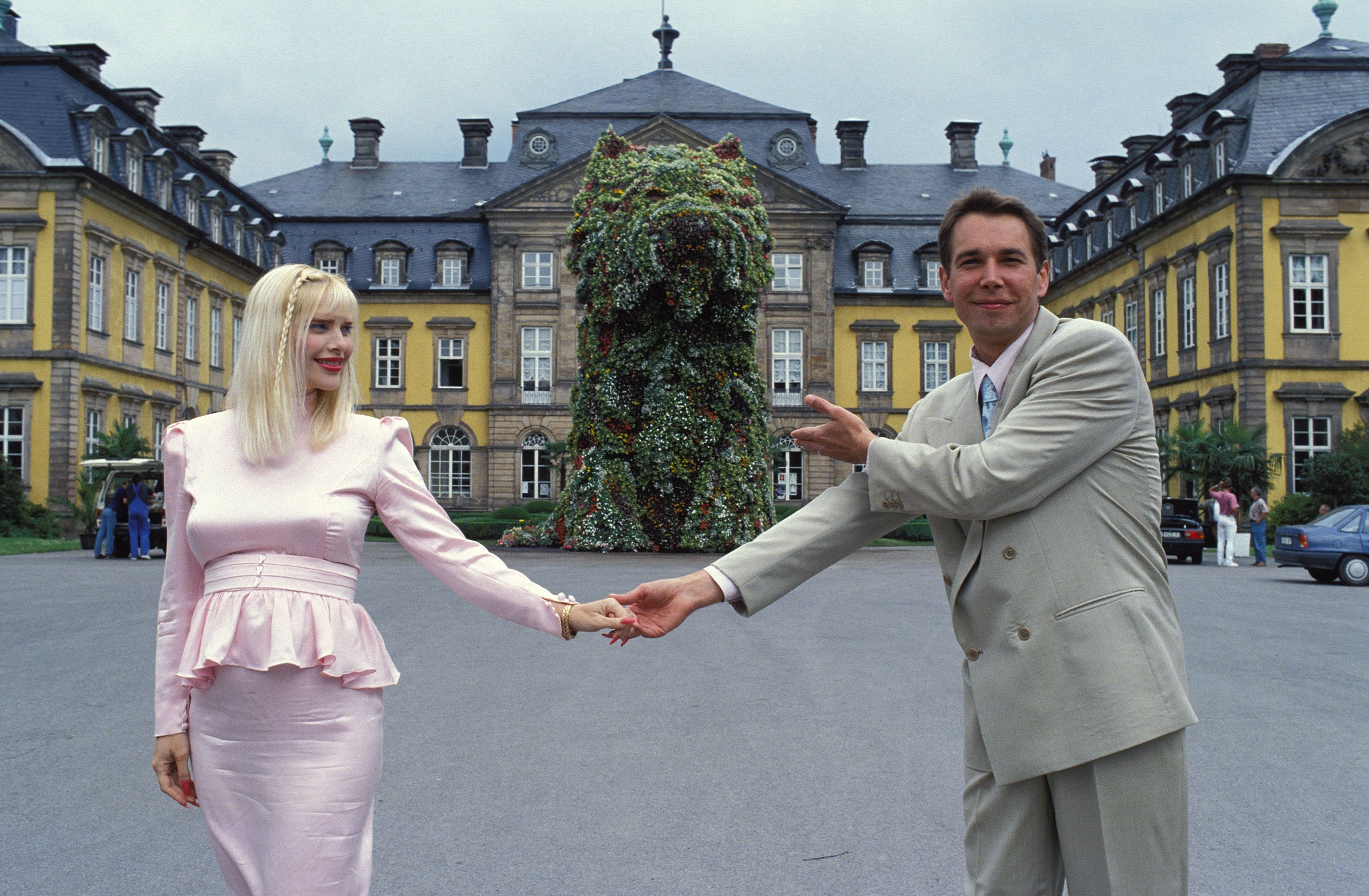
To Kroll, the case of the artist’s wife was one small escapade in a half-century stuffed with them, a hazy memory that offered a self-deprecating anecdote. But to his target, the experience was indelible.
Staller, who was a member of the Italian parliament during her marriage to Koons, was open to discussing the case with me. The operatives had “monitored all my movements everywhere in America,” she confirmed in an email. She declined to say how she had made her escape. “For me it was a very sad time,” Staller wrote. “Too many sorrows.”
A few years ago, during my stint as a foreign correspondent in Berlin, a private-intelligence operative was making the rounds of the local press corps, pitching stories and documents related to Russian President Vladimir Putin. One of my colleagues from a German magazine arranged for us to meet him at the Hauptbahnhof, the city’s central train station. The operative showed up riding a black motorcycle with an outfit to match and carrying a messenger bag full of files.
Spread out on a table at a Dunkin’ Donuts, the documents looked genuine enough. And the stories they told had a tantalizing cast of spies and other agents of the Kremlin. Still, a lot about the operative seemed off. There was no reliable way to check where his documents originated—had they been hacked?—and no clear answer to the question of his motives. We decided not to pursue the story. Months later, the documents appeared in the press. The guy’s facts had apparently checked out.
The incident came to mind one afternoon in August, when I arrived to meet Jules Kroll’s son and business partner Jeremy at a members-only club in Manhattan. It struck me that the Krolls were in the same business as that operative in Berlin— just in different milieus. The train-station encounter had the feeling of a drug deal; this was a power lunch surrounded by expensive art, with coffee in white china instead of paper cups. Jeremy Kroll drank his with almond milk, looking every bit the high-end private detective, which is to say he looked nothing like a detective at all. “I just want to make the work a little bit more boring,” he told me.
In the decades he has spent working alongside his father, their business has adjusted the services it offers to meet client demand. During the U.S. wars in Iraq and Afghanistan, the family company had gone into the private security business, sending contractors to guard clients in conflict zones. Securing the release of kidnapping victims had also been a staple of their work. “That was a crummy business,” Jeremy says. “It was dangerous.”
It’s no longer on the list of services the business provides. Under Jeremy’s leadership, the company has moved into the cyber realm, offering help to victims of ransomware and training companies in digital security. “The criminal networks have gone from kidnapping people to kidnapping data and extorting businesses,” Jeremy says. “We recover data and systems, not human beings.”
His father, on the other hand, remains in thrall to his vintage vocation: searching for stolen assets on behalf of government clients from around the world. The case that fascinates him most these days involves Mongolia, where officials had been accused of siphoning $250 million into offshore assets. The country’s President, elected in 2017 on a promise to fight corruption, had asked Kroll the following year to find the money and bring it back. Along the way, the detective and his associates could expect to keep 30% of the total they recovered.
It was no charity case, even if Kroll had to take it on spec. But he says he took the assignment not just for the money, but rather to prove his point about the industry. “Could the anticorruption agency in Mongolia do this on their own? They can’t,” he told me. Law enforcement agencies in the U.S. have the know-how and influence to seize illicit wealth from offshore banks. But smaller nations like Mongolia, Kroll argues, can only achieve that with help from private investigators. “We’ve been doing this a long time. It’s a level of expertise they just don’t have.”
When we first spoke last February, the Mongolia case was taking up the bulk of Kroll’s time. He told me about the evidence his team had recently presented to a court in New York City, part of a global quest to freeze and recover the assets. Kroll’s statement to the court describes a system of fronts and proxies that Mongolian officials allegedly used to hide “ill-gotten gains among a web of onshore and offshore companies.” The document links this network to the country’s former prime minister Sukhbaatar Batbold, whose party holds the majority in parliament.
Through his lawyers, Batbold denied the allegations, and said the assets in question do not belong to him. To help him counter the claims, he hired one of the world’s most prestigious law firms, Gibson, Dunn, which set out to undermine Kroll’s investigation by attacking his credibility. When I contacted them to ask about the case, they sent me a list of scandals Kroll has been involved in. The Weinstein affair was at the top of the list.
Kroll brushed off the list as a smokescreen, irrelevant to the substance of the case. “Batbold is trying to dirty me up, so he points to Weinstein,” he told me. But the tactic appeared to be working. Kroll’s contacts in the U.S. media had mostly ignored the Mongolia story, despite his best efforts to argue that the case had deep geopolitical significance. Some of the media accounts that emerged focused not on the corruption allegations but rather on the American sleuth investigating them. Kroll attributed the lack of media interest to Mongolia’s obscurity. He did not dwell on the role that his own reputation could have played.
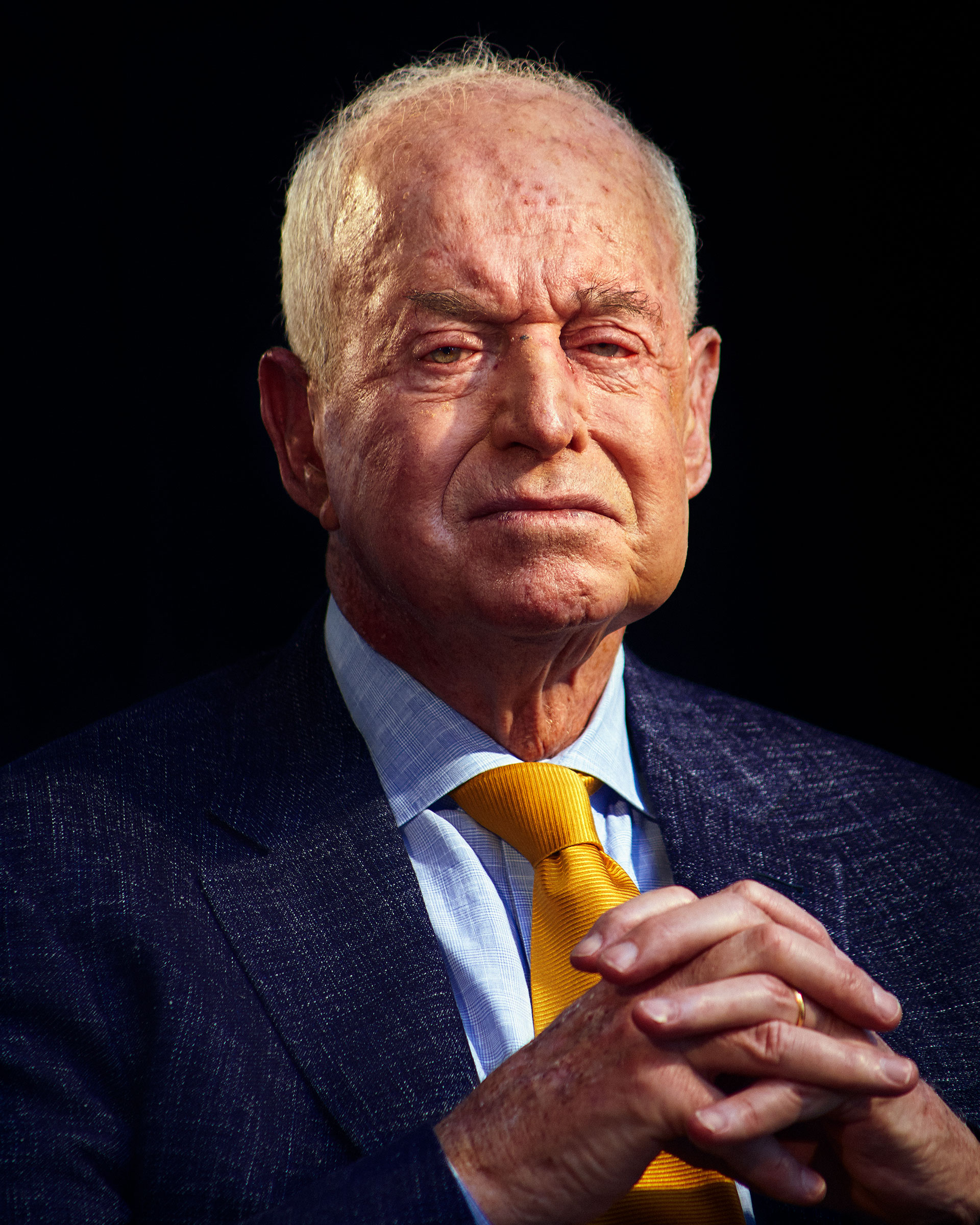
Nor does he seem overly concerned about the recent calls to regulate the tactics of his industry. Those calls remain muted. None of the investigative firms that worked for Weinstein have faced any punishment tougher than public shaming—what Kroll refers to as “reputation risk.” The idea of forcing private eyes to disclose their clients and tactics to a federal regulator have come up in some recent books and opinion pieces. But no one in government has taken up that idea, which Kroll says wouldn’t work in any case.
“I don’t think regulations make it better,” he told me. “There are bad actors in everything. There are bad actors who are lawyers. There are bad actors who are investigative reporters.” But are there more bad actors now in his business than there were in the days when former cops and spies were paid to search dumpsters for documents or monitor the wives of famous men? Kroll thought about it for a moment. The game, he said, has evolved and matured since its early years.
Its players have certainly adapted. In the wake of the Weinstein scandal, some operatives saw the rise of the #MeToo movement and went to work defending alleged abusers; others began helping firms investigate allegations of abuse. If the trail of a plundering government official goes cold, there are digital thieves to pursue. It is hard to imagine Jules Kroll ever giving up the chase. “I have devoted my professional life to this,” he told me. “That’s what I want on my tombstone.”
With reporting by Mariah Espada, Nik Popli and Simmone Shah
More Must-Reads from TIME
- Cybersecurity Experts Are Sounding the Alarm on DOGE
- Meet the 2025 Women of the Year
- The Harsh Truth About Disability Inclusion
- Why Do More Young Adults Have Cancer?
- Colman Domingo Leads With Radical Love
- How to Get Better at Doing Things Alone
- Michelle Zauner Stares Down the Darkness
Contact us at letters@time.com